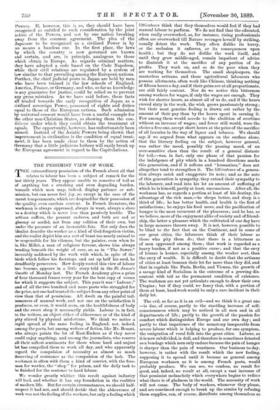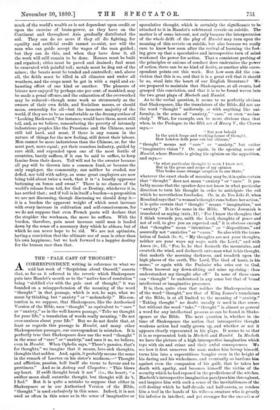THE PESSIMIST VIEW OF WORK.
FriHE extraordinary pessimism of the French about all that
• relates to labour has been a subject of remark for the last thirty years. They appear unable to conceive of toil as of anything but a crushing and even degrading burden, beneath which men may, indeed, display patience or sub- mission, but can never feel joy, or, except in the case of the rarest temperaments, which are despised for their possession of the quality, even careless content. In French literature, the workman is always oppressed, always in want, always a slave to a destiny which is never less than passively hostile. The artisan suffers, the peasant endures, and both are sad or gloomy or sordid, not from any volition of their own, but under the pressure of an inexorable fate. Not only does the idealist describe the worker as a kind of God-forgotten victim, and the realist depict him as a sort of beast too nearly animal to be responsible for his vileness, but the painter, even when he is, like Millet, a man of religious fervour, shows him always bending beneath the weight of care, or, as in "The Sower," incurably saddened by the work with which, in spite of the birds which follow his footsteps and eat up half his seed, he steadfastly perseveres. How deeply rooted this view of labour has become, appears in a little story told in the St. James's Gazette of Monday last. The French Academy gives a prize of four thousand francs every year for the best copy of verses for which it suggests the subject. This year it was "Labour ;" and of all the two hundred and more poets who struggled for the prize, not one had treated the subject from any other point of view than that of pessimism. All dwelt on the painful toil- someness of manual work, and not one on the satisfaction it produces, or even, it would seem, on the healthfulness of body and the sweet sleep it necessarily yields. Labour is, in fact, to the writers, an object either of abhorrence or of the kind of pity stirred by physical misfortune. We think we notice a rapid spread of the same feeling in England, not, indeed, among the poets, but among writers of fiction, like Mr. Besant, who always paints the lot of East-Enders as if they never muld enjoy anything; and among the journalists, who reserve all their softest sentiments for those whose hard and unjust lot has compelled them to work all day, and who apparently regard the compulsion of necessity as almost as much deserving of resistance as the compulsion of the lash. The workman is often with them a kind of convict, with the fore- man for warder, the " shop " for prison, and the daily task to be finished for the sentence to hard labour.
We wonder greatly whither this revolt against industry will lead, and whether it has any foundation in the realities of modern life. But for certain circumstances, we should half- suspect it had not, and should decide that the abhorrence of work was not the feeling of the workers, but only a feeling which
litt&ateurs think that they themselves would feel if they-bid manual labour to perform. We do not find that the educated, when really overworked, as, for instance, rising professionals often are overworked till Nature revenges herself by striking, usually detest the work. They often dislike its hurry, or the seclusion it enforces, or its consequences upon health ; but they do not dislike the work itself, and until they grow middle-aged, remain impatient of advice to diminish it at the sacrifice of any portion of its profits. They work on, and so do the poor when they are working for themselves. The small shopkeepers, the masterless artisans, and those agricultural labourers who possess allotments, often work like Chinese, thinking nothing of fifteen hours a day, and if their gains are at all proportionate, are still fairly content. Nor do we notice this bitterness among workers for wages, if only the wages are enough. They wish for shorter hours, as almost all of us do, and if the hours exceed sixty in the week, the wish grows passionately strong ; but their most genuine feeling is drawn out rather by the amount of their pay than by the hours spent in earning it. Few among them would accede to the abolition of overtime without an increase of wages ; and fewer still would, were the choice a free one, accept short hours at the price of the sacrifice of all luxuries in the way of liquor and tobacco. We should say, if we argued from what appears on the surface alone, that the literary feeling on the subject, however general, was rather the mood, possibly the passing mood, of an over-sensitive class than the result of a general distaste for toil,—was, in fact, only one phase of that passion for the indulgence of pity which in a hundred directions marks this generation, and if it softens and "humanises," does not altogether tend to strengthen it. The litterateurs of a genera- tion always catch and exaggerate its note; and as the note of this generation is sympathy, they extend their sympathy to the labourer, and read into his lot an amount of suffering of which he is himself, partly at least, unconscious. After all, the workman has, as regards a portion at least of his destiny, the advantage of the rich man,—he sleeps better, and sleep is a third of life; he has better health, and health is the first of satisfactions; he enjoys his food more, and the pacification of hunger is the most recurrent of the pleasures; and he has, as we believe, more of the enjoyment alike of society and of friend- ship, the latter a pleasure which the cultivated of our day have in large measure thrown away. It is not, however, possible to be blind to the fact that on the Continent, and in some of our great cities, the labourers think of their labour as those who pity them do; that there is a bitterness as of men oppressed among them ; that work is regarded as a heavy burden, if not as a positive curse; and that the envy of leisure is keener, especially among the weaker sort, than the envy of wealth. It is difficult to doubt that the artisans of cities at least bemoan their lot far more than they did, and that in capitals like Paris, Berlin, and Vienna, the growth of a savage kind of Socialism is the outcome of a growing dis- content with toil as the permanent condition of existence. The workmen are not yet articulate enough to draw their own Utopias ; but if they could, we fancy that, with a portion of them at least, hard work would be only a rare incident in their daily lot.
The evil, so far as it is an evil—and we think it a great one —is due, of course, partly to the startling increase of self- consciousness which may be noticed in all men and in all departments of life ; partly to the growth of the passion for comfort which distinguishes Europe and our own day; and partly to that impatience of the monotony inseparable from severe labour which is helping to produce, for one symptom, the emigration of rural folk into the great cities. Labour, as it is now subdivided, is dull, and therefore is sometimes detested as a bondage which men only endure because the pain of hunger is sharper than the pain of weariness. Our business to-day, however, is rather with the result which the new feeling, supposing it to spread until it became as general among European workmen as it is among French poets, would probably produce. We can see, we confess, no result for good, and, indeed, no result at all, except a vast increase of that pessimist melancholy which everywhere begins to reduce what there is of gladness in the world. The necessity of work will not cease. The body of workers, whenever they please, and are convinced enough to break up the armies by refusing them supplies, can, of course, distribute among themselves so much of the world's wealth as is not dependent upon credit or upon the exercise of brain-power, as they have on the Continent and throughout Asia gradually distributed the soil. They can do no more if they all die fighting, for equality and artificial credit cannot co-exist, nor will the man who can guide accept the wages of the man guided; but they can do this, and when they have done it, all the work will still remain to be done. Houses must be built and repaired; cities must be paved and drained; fuel must be excavated with painful toil ; metals must be dug out of the mines ; the beasts must be tended and controlled; and, above all, the fields must be tilled in all climates and under all weathers, and the crops must be got in with a rapid and ex- hausting effort of one kind or another. The pleasure of leisure now enjoyed by perhaps one per cent. of mankind, may be made a penal offence, and the exhaustion of the overworked may be reduced—though none work so strenuously as the owners of their own fields, and Socialism means, or should mean, ownership for all—but the immense majority of the world, if they are to be as comfortable as the dreamy author of "Looking Backward," for instance, would have them, must still toil, and, as we believe, remembering the poverty of intensely industrious peoples like the Prussians and the Chinese, must still toil hard, and must, if there is any reason in the nature of things for the new feeling, still detest their labour. Men cannot be more industrious than the Chinese, or, for the most part, more ; yet their ceaseless industry, guided by rare skill, and expended upon one of the most fertile of countries, barely suffices, if it can be said to suffice, to keep famine from their doors. Toil will not be the sweeter because all pay will be thrown into a common fund, or because the only employer, the community, can neither be evaded, nor defied, nor told with safety, as some great employers are now being told about twice a week, that it is "a beastly oppressor battening on bones and sweat." There is no chance of the world's release from toil, for God or Destiny, whichever it is, has settled that ; and if toil is in itself a burden—a proposition we are not discussing, though discussing we should deny it— it is a burden the apparent weight of which must increase with every increase in cultivation and sell-consciousness, for we do not suppose that even French poets will declare that the stupider the workman, the more he suffers. With the burden, therefore, pain must increase until man is loaded down by the sense of a necessary duty which he abhors, but of which he can never hope to be rid. We are not optimists, having a conviction that the ultimate use of man is other than his own happiness ; but we look forward to a happier destiny for the human race than that.







































 Previous page
Previous page